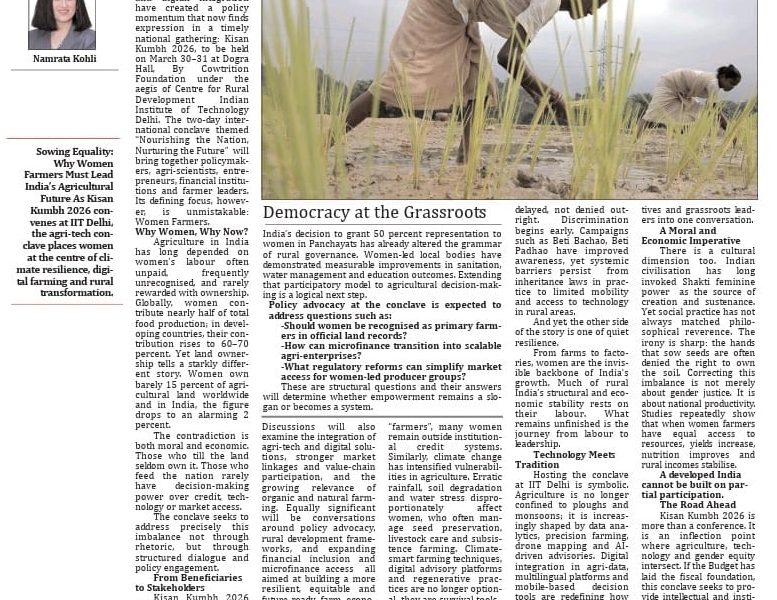Why do women not make money or take money seriously? How many women in India have a concept of “my money” as different from family savings. Rather than a pragmatic view of money being a means to a good life, most women have an emotional relationship with money- one which is tied to guilt, control or sacrifice. Her money is still considered “supplemental” and as a bonus and never as priority. Even in cases where she is earning, there is a hesitation to invest. Women merely save, which is actually negative return- if you saved Rs 100 then next year its value is merely Rs 90 if you factor in inflation of 8-10%. Financial freedom needs to be a goal and not just a byproduct.
Last week, I was a speaker at an event on “Financial Empowerment of Women- Bridging The Gender Wealth Gap” at the TalentNomics India’s 9th Global Annual Conference, in partnership with Konrad Adenauer Stiftung’s Regional Economic Programme Asia (SOPAS). The event titled “Restoring the Equiverse: From Vision to Action” explored various dimensions of financial empowerment or the lack of it. But before financial empowerment, let’s talk about financial literacy. Every woman ought to know a few fundamentals about how they can generate wealth from income- Invest from Day 1 of earning. The younger you are, the greater time you have to reap returns.. say a 20-year-old has a 35-year-old window to earn and maximize return. In money matters, cumulative returns will generate wealth over a period of time. Even if you are a conservative investor who doesn’t want to take many risks, you must still invest in things like the Public Provident Fund (PPF) or National Pension Scheme (NPS). Say if you invested Rs 1,000 today at the rate of 10 percent, next year the interest will be on 1,100 and then 1,210 and so on. As they say compounding is the eighth wonder of this world. Over time, you need to nudge yourself into increasing your risk appetite and also play in the equity market by investing in mutual funds and stocks. After all, greater the risk, greater the rewards. Also PPF and FD etc offer returns of 6-8% which barely “meet” inflation (still better than saving) but a good investment is one which can “beat” inflation like the equity market.

For decades, decisions about income, investment, and even savings were largely managed by male members. Women were encouraged to be “good managers” of household expenses, not wealth creators. Even when we analyse the visual motifs and taglines in most advertisements, it mostly positions women as prudent savers (for festivals/weddings) than dynamic investors.. eg the Tanishq Golden Harvest talks about saving for your favourite jewellery today or Kalyan – Get Gold Coins in 24K Purity with a tagline- ‘Celebrate Festivals with Timeless Traditions’.
These jewellers have promoted schemes that position gold not just as an investment but as a safe, traditional asset- saving for festivals and family needs. Or if you closely examine the nature of media coverage – an Akshay Kumar selling two apartments or Amitabh Bachchan buying real estate in Ayodhya whereas you have stories of airport looks and bags and shoes and holidays of female stars but rarely of their investments. There is a focus on their spending habits rather than their investment acumen. But how many of us know that Deepika Padukone is a serial investor in Blue Tokai Coffee Roasters, Epigamia, Bellatrix Aerospace, BluSmart Mobility or that Alia Bhatt invested an undisclosed amount in Phool.Co- a brand that makes incense sticks from discarded temple flowers or Shilpa Shetty is a key investor in MamaEarth.
Anyways, money has no gender. “You complete me” – as legendary mediaperson Oprah Winfrey mentioned in her book “What I know for sure” .. is a very dangerous way to look at marriage or partnership- that you are incomplete without a partner. Two individuals need to be the best version of themselves to make for a successful partnership and not overtly dependent to the point of being handicapped. Eg there are some men who can’t make themselves a cup of tea just as there are some women who have no interest in money matters. There were stereotypes – that man is a provider and women is the nurturer but today times are changing.
And so is the media coverage which is also “breaking” stereotypes. When tennis superstar and devoted mother Sania Mirza said- “I love doing chores but don’t cook, so I have a chef. And that’s okay!” Through small actions, like showing boys that cooking and chores aren’t just “women’s work”, Sania is proving that big change begins with simple steps. She’s teaching her son, Izhaan, that chores and responsibilities aren’t defined by gender. She’s not just raising a child — she’s doing her bit in shaping a future where equality begins at home.

Media has been highlighting successful women in finance, business, and entrepreneurship by showcasing their achievements and leadership roles. And the stories are pretty diverse —from single moms (Forest Essentials’ Mira Kulkarni) to women taking over family offices (Gitanjali Kirloskar who lost her husband Vikram Kirloskar a fourth generation entrepreneur to a heart attack) to corporate leaders (such as Arundhati Bhattacharya), to women who started business in the middle ages at age 50 (Nykaa founder) to women saving the business from bankruptcy through smart decisions like Malavika Hedge, CEO of Cafe Coffee Day (CCD) who turned the fortune of the coffee chain, media has been doing its bit in breaking stereotypes.. Even reigning content in mainstream cinema such as Laapata Ladies which alludes to importance of education and employment of women -turning around the concept of invisibility of women to invincibility is noteworthy … No wonder it won the Oscars.
The recent Franklin Templeton recent #ChangeTheSoch campaign or Dove’s mothermonial campaign #TheBeautyTestStopsWithMe which condemns matrimonials saying “slim, fair, beautiful bride” and relooks daughter’s profile from the eyes of her mom as the girl being “National level basketball player, intelligent, witty” is poised to change the narrative.
The COVID 19 pandemic came as a jolt to many women who started managing money post-2020 out of necessity. I remember a woman in our society who suddenly lost her husband in the second wave not knowing where the money was kept – and she had to borrow money from fellow neighbours to even burn the pyre.
But today, slowly and surely things are changing. SIPs, mutual funds, real estate, crypto, gold – Indian women are no longer on the sidelines. You have a woman running the finances of the country as the finance minister. Plus the highest constitutional office of being the President is held by a woman today.
Today there are more women as first-time homebuyers. And kudos to the government’s policy push and incentives for female financial inclusion that deserves a lot of appreciation.
But ultimately the buck stops with you. You need to realize that money is so important. After all, paisa is “power”, paisa is “purpose” beyond being a means to fulfilling needs.
So what is your money story- do you Ignore or Invest your money?




